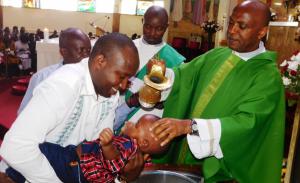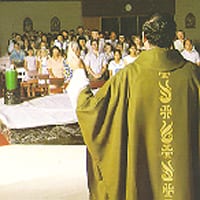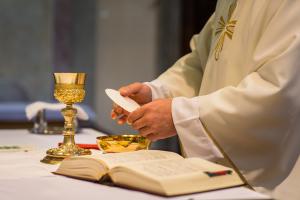
Celebrations of Grace: The Sacraments of the Catholic Church, Part 11
Baptism takes away Original Sin. It confers sanctifying grace. It conforms a person to Christ and makes one a member of the Church. Baptism seems to be a great sacrament for an individual person. I believe it, but there’s something missing that is equal or maybe even ahead of that in importance. Baptism is a great blessing for the Church.
Crossing the threshold
Baptism is a liminal sacrament. It’s a crossing over from outside to inside the Church. I remember many years ago having the honor of being godparent at the Baptisms of a newborn niece and nephew. I remember answering questions to indicate that I was willing to undertake this responsibility. Those were Sunday afternoon ceremonies held near the entrance of the church. Only immediate family and friends were present. It looked like holding a door open for the newly baptized to walk through and suddenly become one of us.
That doorway experience is still part of the baptismal ceremony. The priest or deacon will greet the one to be baptized along with family and friends at entrance to the church. The baptismal font may be at that same entrance area, but it may also be more centrally located in the church. The font itself has a more substantial presence than the small bowl that I remember from my youth. It’s like saying that what’s happening in Baptism is important for all of us.
Today Baptism often occurs during Sunday Mass. When I’m present at these occasions, I feel something different from what I felt before. It’s a feeling of growth. The community that I am part of and that is part of me is now significantly bigger than it was before. As a parent and grandparent, that feeling is familiar. It’s like being expanded through space and into the future by this new life. Baptism is about the future of the Church.
There’s no such thing as a private sacrament. Even when the Baptism ceremony included only a small group, still that group represented the whole Church. Today that theology is more obvious with the whole community of a Sunday gathering welcoming the newly baptized person.
Limbo
But much more than a bigger welcome and a clearer signaling of the Church’s intent in Baptism is afoot in the new baptismal liturgy. You can see that in the fate of Limbo.
I went under the waters of Baptism 12 days after I was born. That was about standard in those long ago days. Catholic parents typically didn’t wait long for fear a child might die before receiving the grace of Baptism. Such a child, people thought, would be without sanctifying grace, the grace that makes us children of God. That child would not be punished in hell, but neither would it go to heaven. It would spend eternity in a state of merely natural happiness called Limbo. Understandably, parents would seek Baptism for a child as soon as possible.
Many had begun to question the teaching about Limbo by the time my wife and I had our first child,. I reasoned that she was a fruit of the sacrament of Matrimony. Hence, she could only be in the loving arms of God from the moment of her conception. Her Baptism was somewhat more than 12 days after her birth. We didn’t worry about her eternal salvation should death take her before then.
That was in 1979. Pope Benedict officially abandoned the teaching of Limbo in 2007.
Exorcism
Comparing the new and old rites of Baptism reveals another way Catholics have changed the way we think about the newborn child. Exorcism has a much smaller place in the new rite. Both rites refer to the works of the devil, but the new rite doesn’t imagine the devil with a power over and presence in the newborn child as the old rite does. The new rite, now called the Ordinary Rite of Baptism, has a prayer of exorcism. But the old, or Extraordinary, rite, has at least four prayers of banishing and protection from the devil.
One traditional Catholic site says the Extraordinary Form presents “an unabashed Catholic theology regarding the reality of evil.” Unabashed it is, but I think also unreal to imagine inhabiting a newborn child evil spirits that must be cast out. The new rite has two options for the prayer of exorcism. Here is one of them:
Almighty God,
you sent your only Son
to rescue us from slavery of sin,
and to give us the freedom
only your sons and daughters enjoy.We now pray for this child
who will have to face the world with its temptations,
and fight the devil in all his cunning.Your Son died and rose again to save us.
By his victory over sin and death,
cleanse this child from the stain of original sin.
Strengthen him (her) with the grace of Christ,
and watch over him (her) at every step in life’s journey.
We ask this through Christ our Lord.
All: Amen.
Both prayers recognize the power of the devil and the reality of sin. This one foresees the kind of battle that awaits the one who chooses to follow God will in this world.
Hope
There’s a great deal of uncertainty in today’s world. Bringing a child into this world is a courageous and hopeful act. I think about my own hopes for the future every time I see parents with a new baby. I think about what kind of future awaits that child and, vice versa, what that child might mean for whatever future awaits. In either direction, only God’s grace justifies our hope.
It’s the same in the family of the Church. As a family of human beings, we participate in the sin of the world. Yet we presume to welcome new members into that family, putting all our trust in God rather than ourselves. Trust works in the other direction as well. With each new member we don’t really know what we are getting, but we know we will be changed. Again only trust in God’s grace fortifies the hope we feel with every new member.
Traditional teaching seems to have been all about the change in the person being baptized. But just as surely the Church changes with the addition of each new member. Even the newborn baby comes as more than a blank slate. She comes with graces that preceded the grace of Baptism, graces that the Church didn’t have before.
It is even more apparent that Baptism brings new graces into the Church when an adult comes for Baptism. That person brings in a long history in which God’s grace has been at work. The still fairly new Rite of Christian Initiation of Adults will be in focus in a future post.
Image credit: Our Lady of Africa Parish, via Google Images













